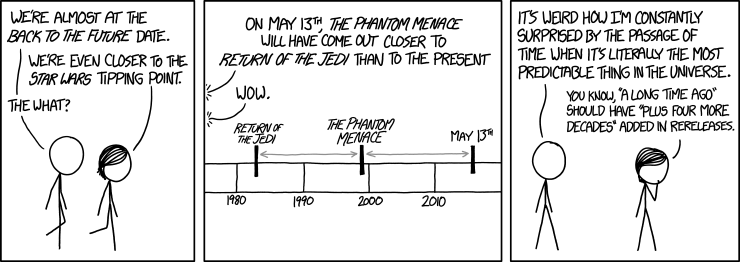Since We Have Now Passed The "Star Wars" Event Horizon…

And as it happens, we rewatched all three of the prequel movies this week. And every time, I have the same damn reactions:
Why did the Jedi fight so boring?
In Star Wars, we got empathy and mind control. In Empire Strikes Back, we got clumsy telekinesis. In Return of the Jedi, we got Force Lightning.
And in all three prequels, we see the Jedi at the height of their powers, and we see… the exact listing of powers.
I’ve literally seen more variance in the Star Wars videogames.
Come on, man. These are the Jedi Knights, and every swordfight is a cut-and-copy of the Holy Trilogy. I was hoping for new and exciting uses of Jedi powers that we see in fan films, the tie-in novels, even the Clone Wars cartoons, and it’s like the inspiration just ran out.
Why did Yoda have to fight?
Oh, God, having the great Jedi master be a badass at combat was such a mistake. Here’s what he should have done, and why.
Why did we have to see Anakin as a young boy?
Seriously, it added nothing. You could skip the Phantom Menace in its entirety and the story could start there, with a minor backfill to explain Ani’s mother in slavery. It’s two hours of wasted time.
Why was Qui-Gon Jinn so goddamned concerned with Anakin?
We know that Qui-Gon Jinn wanted to “bring balance to the Force,” but that’s not a motivation: that’s a reason. And as a writer, motivations trump reasons.
Take another example: why does Darth Vader try to recruit Luke in the Empire Strikes back? The reason is that he needs an ally to fight the Emperor. Okay, fine, but emotionally that doesn’t tell us what itch that’s scratching in Vader’s burned little head.
The motivation is that he wants to join up with his long-lost son and create a new family.
Reasons give us logical rationales. Motivations tell us what emotional urge this satisfies.
We have reasons for Qui-Gon Jinn going “WE HAVE TO MAKE THIS BOY A JEDI.” But at no point do we know why he’s so hell-bound on this. Is Qui-Gon Jinn dissatisfied with the Jedi Council’s lying and secrecy and secretly wants to undermine it? Was he himself an orphan at some point and cannot bear to leave a boy behind? Is Qui-Gon Jinn just secretly sick of whiny Obi-Wan and is desperate to find himself a new partner?
Done properly, when the trilogy finished, we’d have an idea of whether Qui-Gon ultimately got what he wanted, or whether things went horribly ironically wrong for him. As it is, Qui-Gon Jinn is an enigma: his every action tells us what he wants, but we never find out why.
Why did Lucas get so wrapped up in terrible CGI?
Watching Revenge of the Sith, there’s a great moment where Anakin and Obi-Wan climb out on a gantry, fighting, and it’s clear it’s a real gantry. The actors have to adjust their weight, look worried they might fall off, are tentative.
Then, two minutes later, Anakin is standing on a tiny robot zooming forward at thirty miles an hour over a river of lava, and he looks exactly like he’s standing on a greenscreen floor. Because he is.
Cracked has a good article on why modern CGI looks surprisingly crappy, but it’s particularly telling in Lucas films, where the actors don’t seem to have been told where they are. There’s one scene in the latest Raiders where the actors are standing feet away from boulders rocketing past their face, and they don’t react like humans by cringing or expressing some hesitation or nervousness, because they’re not rooted in the moment.
I wish Lucas had recognized that practical effects make the actors sell it more.
Was Anakin justified or not?
The biggest problem with the sequels is it wants to have it both ways: Anakin Skywalker’s fate is a tragedy, but he’s not really a villain. And so it dilutes its punch by going, “Well, Anakin’s bad, but he’s got some good sides!”
You gotta commit, George. If the Jedi Council was bad, then show how worm-infested they are. And if Anakin was bad, then he’s gotta do more than kill some offscreen “younglings.” But as it is, Revenge of the Sith’s strongest scene is where the Emperor is talking to Anakin about how the Jedi council is spying, and stealing, and they obscure knowledge, and yet oh wait they’re the good guys and who’s right again?
There’s ambiguity, and there’s feeling like the movie can’t make it its damn mind. The prequels flop back and forth between whether the Jedi Council was efficient and undermined by a creatively evil mastermind, or weak and shoddy and deserving of fresh ground. Alas.
If Padme really didn’t want to have anything to do with Anakin, how come an experienced politician like her invited him alone to her romantic bungalow and wore skimpy outfits straight out of the Frederick’s of Hollywood catalogue?
Did someone tell the costume designer what this scene was supposed to be?
Where did Padme’s motivation disappear to?
She died of a broken heart? Just gave up? Oh, well, that’s good.

